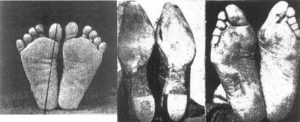Q9: Is it actually healthy to go barefoot?
Yes, very much so.
The vast majority of all foot problems treated by podiatrists and other medical specialists are directly caused by or exacerbated by shoe wearing (The Barefoot Book, by Dr. Daniel Howell). These include bunions, hammer toes, corns, calluses, ingrown toenails, blisters, athlete’s foot, toenail fungus, plantar warts, weak arches, neuromas, and plantar fasciitis.
 Left: Healthy feet of a habitually barefooted person. Right: deformed feet of a chronic shoe-wearer.
Left: Healthy feet of a habitually barefooted person. Right: deformed feet of a chronic shoe-wearer.
But the wearing of shoes can present problems not limited to just the feet. Shoes change the way we walk, frequently alter the spine, and can have a debilitating effect on knee and hip function. There have been numerous accounts from barefooters over the years who have reported significant improvements in knee and hips problems and pain after switching to a barefoot lifestyle.
In 2006, Drs. Najia Shakoor and Joel A. Block published a study in Arthritis & Rheumatism entitled “Walking Barefoot Decreases Loading on the Lower Extremity Joints in Knee Osteoarthritis,” which demonstrated conclusively that such patients undergo a significant reduction in their joint loads at both the knees and the hips while walking barefoot compared with when walking in their normal shoes.
In addition, there are many other studies done in recent years which also confirm or strongly suggest that going barefoot improves foot health and overall body health and well-being. Some of those studies can be found on our Medical Research page. Although there has been an increase in such studies recently, negative effects of shoes have been known and documented for well over a hundred years.
In 1905, Dr. Phil Hoffman of St. Louis traveled to numerous undeveloped countries to observe the foot and skeletal structures of people who had always lived barefoot. He noticed and documented the differences between their feet and those he had observed during his medical work in the U.S. The differences were quite significant in most cases. In this seminal work, published as “Conclusions Drawn from a Comparative Study of the Feet of Barefooted and Shoe-Wearing Peoples,” Hoffman concluded that:
It is very significant that in the one hundred eighty six pairs of primitive feet examined, I did not find a single foot associated with the symptoms of weakness so characteristic and common in adult shoe-wearing feet, which are weakened by the restraint the shoe exerts over function.
As Hoffman discovered, the strongest and most disorder-free feet are feet that are habitually bare.
Similar conclusions were reached by another medical expert, Dr. William A. Rossi, in a series of articles written between 1999 and 2002, and published in Podiatry Management. These can be found on our Medical Research page.
In addition to the more obvious and documented health benefits of going barefoot on a regular basis, even newer and groundbreaking research strongly suggests that nonpathogenic bacteria found in soil are important for a normal immune system as well as for psychological balance. Bare feet obviously have a greater opportunity for such exposure. The study, “Identification of an immune-responsive mesolimbocortical serotonergic system: Potential role in regulation of emotional behavior,” is directly available online, but is explained quite well in the Wikipedia article “Mycobacterium vaccae.”
Contrary to what some people may think, a bare foot is no more likely to contract some disease or infection than any other part of the body, and in many ways is actually less likely. Human feet were made and designed to walk on the ground and to touch whatever may be on the ground or other surface we may be on. That is their normal function, and no protection or support is needed for them to function normally and be healthy. Yet many myths and old beliefs still exist. In this day and age of education and enlightenment, it seems strange that we still sometimes may hear something like, “Put some shoes on, or you’ll catch your death of cold!” No, that’s not going to happen.
See Health Benefits of Going Barefoot to read first hand experiences of actual barefooters and the resulting health benefits they gained.
